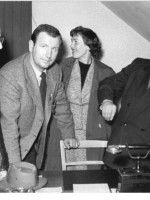Erika Dunkelmann est un Acteur né le 16 novembre 1913

Erika Dunkelmann (1913–2000) was a German film and television actress. Based in East Germany, she worked regularly for the state-controlled DEFA studios.
Source : Wikidata
Erika Dunkelmann

- Infos
- Photos
- Meilleurs films
- Famille
- Personnages
- Récompenses
Naissance 16 novembre 1913
Mort 14 février 2000 (à 86 ans)
Mort 14 février 2000 (à 86 ans)
Le plus souvent avec
Filmographie de Erika Dunkelmann (25 films)
Acteur

Ein Lord am Alexanderplatz (1967)
Réalisé par Günter Reisch
Genres Comédie
Acteurs Erwin Geschonneck, Sabine Thalbach, Carola Braunbock, Armin Mueller-Stahl, Angelica Domröse, Erika Dunkelmann
Rôle Frau Schlosser
Note65%





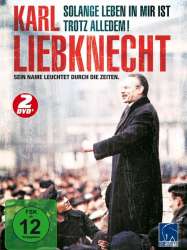
Karl Liebknecht (1965)
, 1h54Réalisé par Günter Reisch
Genres Drame, Biographie, Historique
Thèmes Politique, Politique
Acteurs Mikhaïl Oulianov, Albert Hetterle, Jutta Hoffmann, Erika Dunkelmann, Zofia Mrozowska, Siegfried Weiss
Rôle Milda Schreiner
Note72%





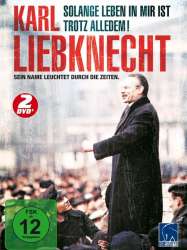
Solange Leben in mir ist (1965)
, 1h54Réalisé par Günter Reisch
Genres Drame
Thèmes Politique
Acteurs Albert Hetterle, Erika Dunkelmann, Siegfried Weiss, Hans Finohr, Adolf Fischer, Werner Dissel
Rôle Milda Schreiner
Note72%





The film opens in Berlin in 1914, as Germany is preparing for World War I. Liebknecht (Schulze) receives a call from a fellow lawyer and revolutionary, Mr. Rauch, that documents have been found proving the German heavy arms industry's secret involvement in the buildup to the war. He brings these documents to a meeting of the Reichstag, accusing Gustav Krupp and his company of bribing officials to release military secrets. In addition to this, Krupp and his company wrote to ask the French media to state that the French military has twice as much artillery as they actually possess so that they may provoke a surge in militarism. Afterward, while celebrating a friend's wedding, Liebknecht learns of the assassination of Archduke Franz Ferdinand, recognizing that this is the war the German imperialists were seeking. However, the resources for war still need to be approved. Liebknecht immediately begins campaigning among the public, denouncing the war as a means to secure profit for the capitalists. In an SPD party meeting, Liebknecht is one of only fourteen members to vote against the war credits. In the subsequent Reichstag meeting, he votes with the party discipline in favor of the war credits, to the public's surprise. He announces in the party meetings that he will no longer yield to party discipline and will stand by his anti-militarist principles even if the party leadership will not do the same. Liebknecht is the only one of the Reichstag — including 111 SPD representatives — to vote against the war loans, resulting in a number of death threats and work bans. Despite his immunity as a Reichstag member, Liebknecht is called to serve on the front as a sapper. It is here that he writes his 1915 manifesto, "The main enemy is at home!" The manifesto is passed among his fellow soldiers on the front before returning home. While he is away, Paul Schreiner, whose wedding Liebknecht attended earlier in the film, dies on the front. This leaves his wife Käthe to raise their newborn child alone and make Liebknecht's manifesto public.

Die Glatzkopfbande (1963)
Genres Drame, Policier
Acteurs Ulrich Thein, Brigitte Krause, Jutta Wachowiak, Erika Dunkelmann, Rolf Römer, Steffie Spira
Rôle Frau Pohl
Note56%





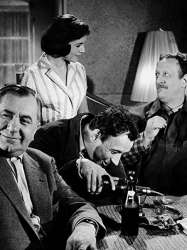
Das verhexte Fischerdorf (1962)
Genres Comédie
Acteurs Brigitte Krause, Erika Dunkelmann
Rôle Frau Brödel
Note55%





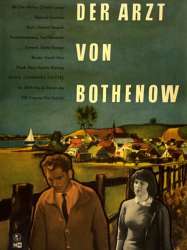
Der Arzt von Bothenow (1961)
Genres Drame
Acteurs Erika Dunkelmann, Christine Laszar, Martin Hellberg, Raimund Schelcher
Rôle Erika Adler
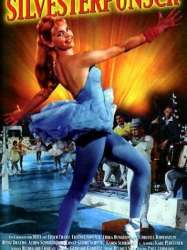
Silvesterpunsch (1960)
, 1h31Réalisé par Günter Reisch
Genres Comédie, Musical
Thèmes Musique
Acteurs Erika Dunkelmann, Christel Bodenstein, Alfred Müller
Rôle Marion Lehmann
Note51%





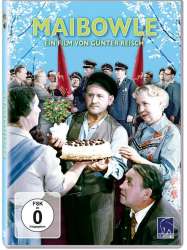
Maibowle (1959)
, 1h30Réalisé par Günter Reisch
Genres Drame, Comédie, Musical
Thèmes Musique
Acteurs Christel Bodenstein, Albert Hetterle, Erika Dunkelmann, Fritz Diez, Jürgen Holtz
Wilhelm Lehmann is informed that he will receive the Order of the Banner of Labor on his sixty-fifth birthday, for being the best worker in the most successful chemical plant in the country. However, it is soon made clear that all his grown up children have other plans for the day, and none of them can arrive to honor their father and their mother Auguste. But, after a series of comical mistakes that lead to utter pandemonium, all the sons and daughters eventually appear to greet Wilhelm as he is awarded the Order. The whole family drinks the traditional May wine, as they have done in every year.

Klotz am Bein (1958)
Genres Comédie
Acteurs Christel Bodenstein, Gerhard Bienert, Sabine Thalbach, Erika Dunkelmann
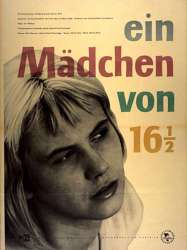
Ein Mädchen von 16 ½ (1958)
Genres Drame
Acteurs Helga Göring, Gerhard Bienert, Manfred Krug, Erika Dunkelmann, Werner Dissel
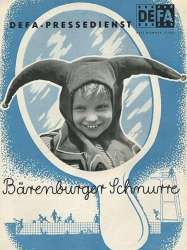
Bärenburger Schnurre (1957)
, 1h15Réalisé par Ralf Kirsten
Acteurs Erika Dunkelmann, Helga Göring
Rôle Hansels Mutter
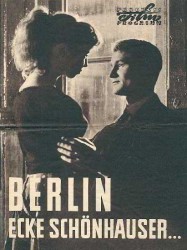
Berlin - Ecke Schönhauser... (1957)
, 1h21Genres Drame, Romance
Acteurs Ilse Pagé, Raimund Schelcher, Helga Göring, Erika Dunkelmann, Siegfried Weiss, Gerd Michael Henneberg
Rôle Kohles Mutter
Note64%





Dieter, Angela, Kohle and Karl-Heinz are part of a group of delinquent youths who prowl Schönhauser Allee, in Berlin's Prenzlauer Berg. The four, each with his troubled life, are often in trouble with the police. Karl-Heinz steals an identity document and uses it to enter West Berlin, where he murders a man while committing armed robbery. The police suspect that his friends assisted him. When he returns, Kohle and Dieter confront Karl-Heinz about an unpaid debt; he threatens them both with a pistol, and Kohle knocks him unconscious. Karl-Heinz recovers and runs away. But Dieter and Kohle believe they have killed Karl-Heinz. Kohle and Dieter get assistance in fleeing to West Berlin, and are staying in a home with other young men. They plan to get to the Federal Republic of Germany. Before long Dieter wonders whether Karl-Heinz is really dead, and whether it would be safe to return to East Berlin. He is threatened by some of the young men in the home where they are staying. Kohle is concerned that the two friends will be separated. He drinks a solution of coffee and tobacco to feign illness, so he can't be sent away. On the next day, Dieter discovers Kohle dead, poisoned by the beverage. Dieter returns home, where Angela awaits his child, and explains the situation to the police. He is released, while Karl-Heinz is imprisoned.

Schlösser und Katen (1957)
, 3h23Réalisé par Kurt Maetzig
Genres Drame
Acteurs Raimund Schelcher, Erika Dunkelmann, Erwin Geschonneck, Helga Göring, Hans Finohr, Ulrich Thein
Rôle Marthe
Note67%





In a feudal estate in Mecklenburg, the hunchback coachman Anton Zuckman married maid Marthe, who was pregnant with Baron von Holzendorf's illegitimate child, in exchange for a letter promising that the baron would recognize his offspring when it would wed and endow it with 5000 Mark. Marthe gave birth to a daughter, Anna, nicknamed Annegret.
 Connexion
Connexion
